Are you perpetually disorganized when it comes to bills? We’ve been there! I need bill organization tips – and that’s why I wrote this!! Bills organizing is just so challenging that it might take up a whole day to do it… and I’m not even close to finishing them. I have actually been threatened multiple times to have my water shut off because due dates are way past, and I forgot my payment schedule as my city didn’t have an autopay bill paying process and I would just forget to pay it!
Talk about stress!! No more!! We need the easiest way for bill solutions to help us stay organized once and for all. Turn those paper bills, electronic bills, or any utility bills into paid bills without having to pay late fees because the bill’s due date’s passed.
Here are 11 genius tips that we’ve found to help you keep track of your bills and keep them organized. No matter if you’re a pen-and-paper type, online banking junkie, or a spreadsheet fanatic, you’ll find some useful bill organization tips here.
Bills Organizing Tips for Folks Who Have a Disorganized Budget
1. Use a Bill Checklist to Stay On Top of Bills
You might have a smartphone with free app to pay online bill, but in this tip, it works just like printed similar technologies. All you need is a printable bill checklist to check off your bills as they’re paid each month. I love using this one as it is super simple even for folks who are chronically disorganized or allergic to budgets. This printable even includes an auto-pay column so that you can easily check off any bills that are deducted from your accounts automatically.
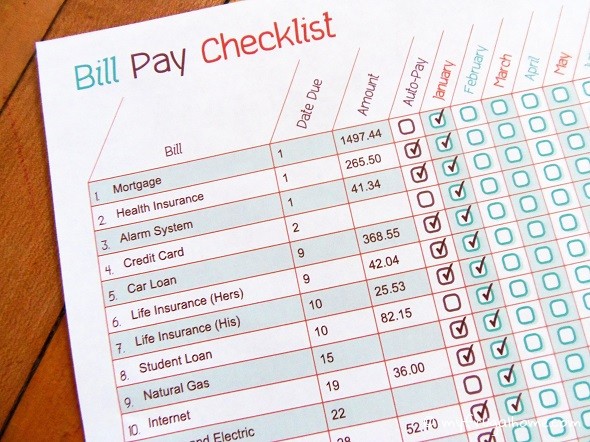
2. Track Your Receipts
Want to organize paperwork for your monthly bill payment and monthly expenses? Paper tracking of bills and receipts is good – especially if you are a business owner, you have to keep those for a few years, but for the rest of us using a digital tracking system is super helpful.
If you’re like most of us, you use your debit card a lot and may lose track of receipts now and then. You could keep your receipts in a 3×5 cardholder. It’s handy to just drop it into your bag… But we also love the app version you can find here. These receipt organization tips help you keep them organized, especially if you have to track both personal and business receipts.
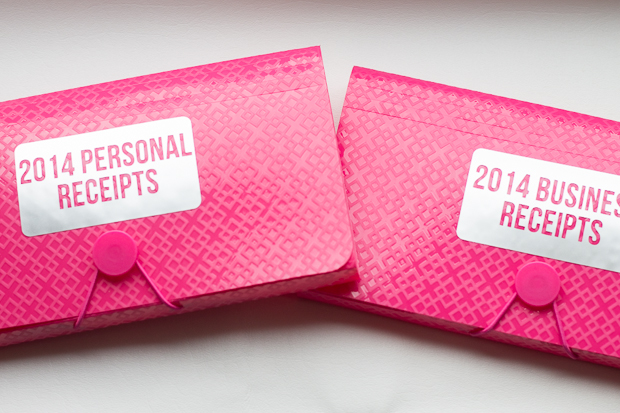
3. Keep Your Family Budget on a Spreadsheet!
It may be old school compared to an app – but using spreadsheets WORK!! It’s the system that my family has used to track payments. We can even download our bill and payment activity into the spreadsheet – less typing is always a good thing!
Want to make a budgeting system that’s completely customized to your family’s unique situation? Follow these tips to create an excel budget spreadsheet with only the items that you need.
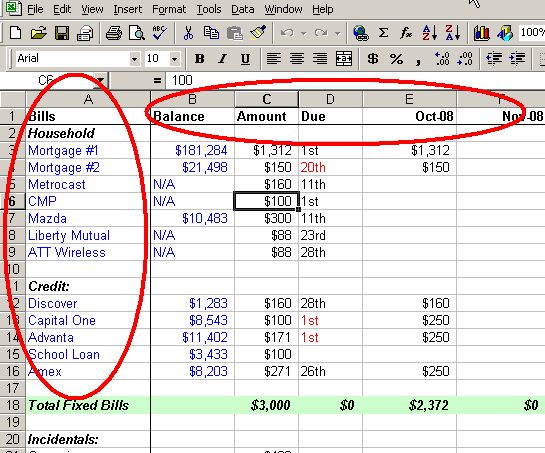
4. Create a Family Budget Station to Organize Your Bills
So, paying bills isn’t exactly most people’s idea of a good time, but it would be a lot more enjoyable to sit down at a pretty bill payment center like this one to pay bills. There’s a place for incoming and outgoing bills, a bill tracker, a record of accounts, and so much more!
Your Family Budgeting and Bill Organization Station Should Include:
- Receipt Box
- Bill Tracking Sheet
- Incoming Bills and Mail Stack
- Bills-to-be-filed-folder
- Envelope system – Keep them Here
- Money Savings Tracker
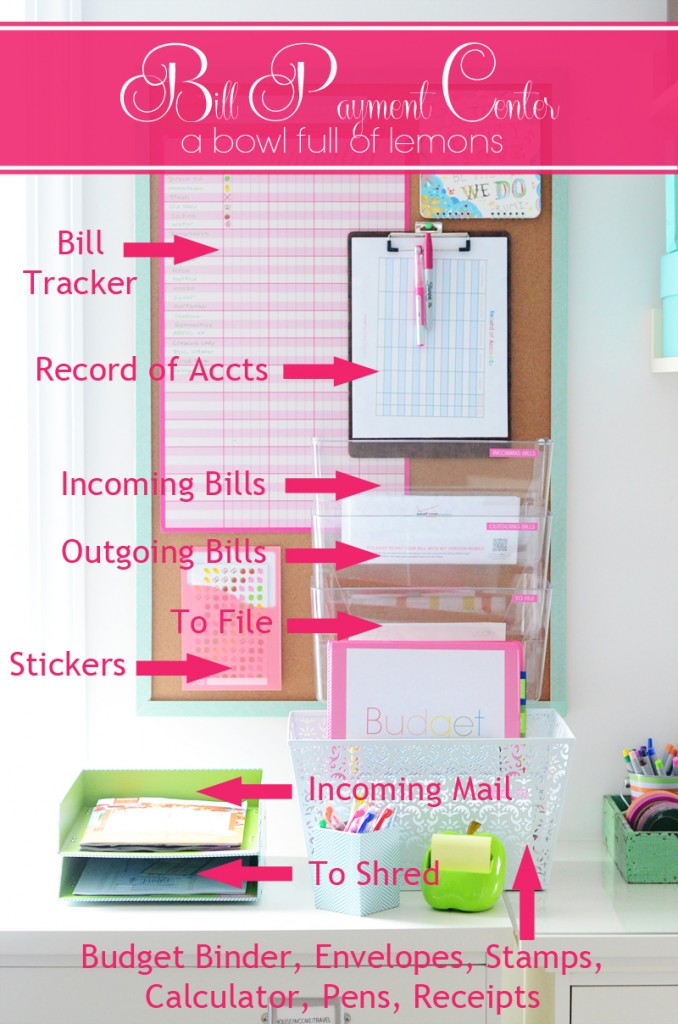
5. Cabinet Family Command Center for Bill Organization
No room for a command center? You know you need a place to keep all of your bills neat, tidy, and organized… but WHERE?? Right?? You and you may not want anyone seeing it!! That is what I just LOVE about this cabinet command center it is doable in any home, and it’s pretty practical if your kitchen is one of the first rooms you walk into. And hidden!! No one needs to see your bill organization “spot”.
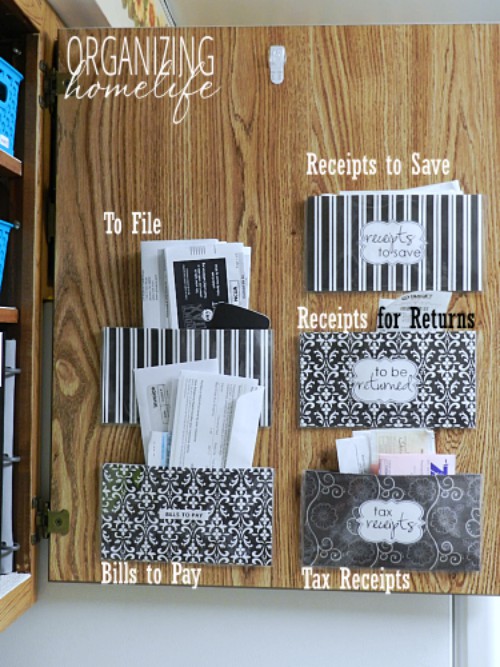
6. Trapper-Keeper Bill-Keeper
Remember in High school how we stayed organized and kept track of all the things we needed to do in a trapper keeper?? Just me?? Well, here’s an alternate system: a bill payment binder. The perks of this bill organization system are that you can literally bring it with you anywhere. And if you are like me and carving out time to organize your family on the go – while at soccer tournaments or while you are waiting for a kiddo to get their braces adjusted, this will be your lifesaver!! You can get your finances organized wherever you are.
We love how it includes everything in one tiny spot… even a calculator so you don’t have to dig through the junk drawer (or your kids’ backpacks) to find one.
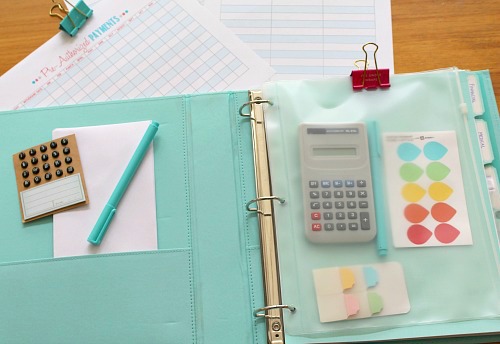
7. Bill Storage – For those important docs you can’t forget!
Wondering how long you should keep medical bills, mortgage payments, and the like? Here’s a handy chart!
Looks like I haven’t been keeping some of our bills nearly long enough.
You want to keep bank statements, receipts, and atm slips for 1 month – until you get them recorded into your system. You will want to keep your paycheck stubs, mortgage statements, insurance records (even if they expired), and all business P&L statements (that’s profit and loss for the rest of us), for 1-3 years. You want to have those in case you are audited. We keep them in boxes labeled by the year. And for 7 years you will want to keep your tax returns, medical bills for major issues, and anything regarding property owned.
Here is a nifty chart that can help you stay on top of organizing your bills.
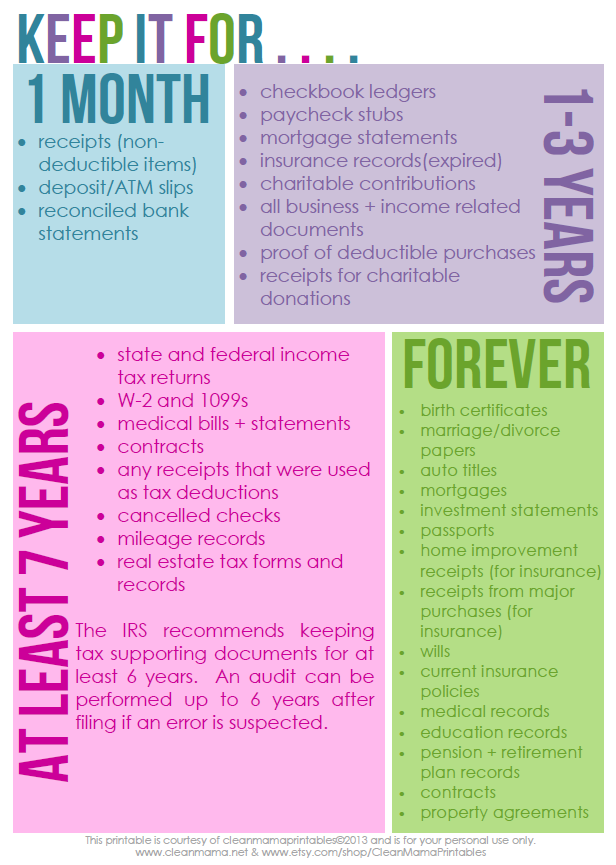
8. Use the Envelope Budgeting System
If you haven’t heard of the envelope budgeting system, you’ve got to try it. Literally, this was the system that my husband and I used when we were in debt to get us out of debt. At the beginning of the month, I would go to the bank ATM and withdrawal my expenses for the month in cash. I put cash in envelopes for expenses that tend to get a little out of hand, and once the cash is gone, that’s it! You have to wait until your next paycheck to replenish it rather than spending from somewhere else or charging it to a card.
Stash return envelopes in a pocket in the front of your bill binder and use a hole punch to put the statements inside. It’ll keep things much neater during the month.
There is also a budgeting app that can help you do this too it can be found on both iTunes for iPhones as well as for Android devices. It connects to your bank and will virtually put your money into envelopes. It is a great digital version of the envelope budgeting system.
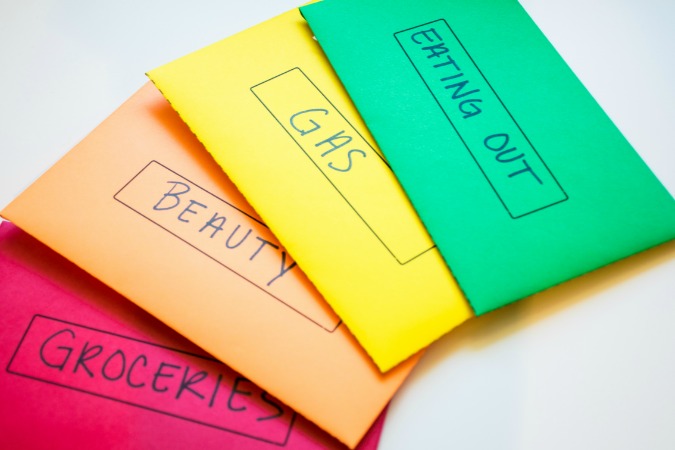
9. Bill Organization and Budgeting Journal
Are you into bullet journaling? If so, that may be the perfect place to keep track of your finances. Check out this bullet journal bill tracker for inspiration.
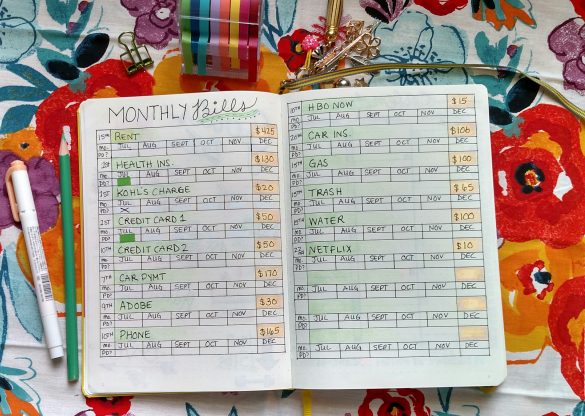
10. Track your recurring and upcoming Bills
Never be blindsided by a bill again. It’s so easy, you can keep track of when bills are coming due and even see them coming months ahead so you can be prepared – Always. And even build up that rainy-day fund for when you have a car break down or need new tires that you weren’t expecting, because you have your main expenses and bills tracked, you will know what you have available and can be better prepared.
That’s why we love using a monthly planner. I can easily see what is paid and what is not and when the bills are due. For pen and paper people like myself, this is a much better method than trying to track everything online.

11. Create a Life Vision Board
Wondering what a vision board has to do with budgeting and bills. I get it, I would be wondering too… the reality is that when we are saving our money we are doing it FOR a purpose!! Keep that purpose in mind, front and center. Remember why you are working to pay your bills on time, remember why you are paying off that credit card!! And stay motivated.
For MORE bill organization tips, check out these posts:
- Get Rid of Paper Clutter Right Now
- The Ultimate Guide to Home Organization
- Hilarious Ideas to Gift Money to a Teen
- Hobbies that MAKE You Money
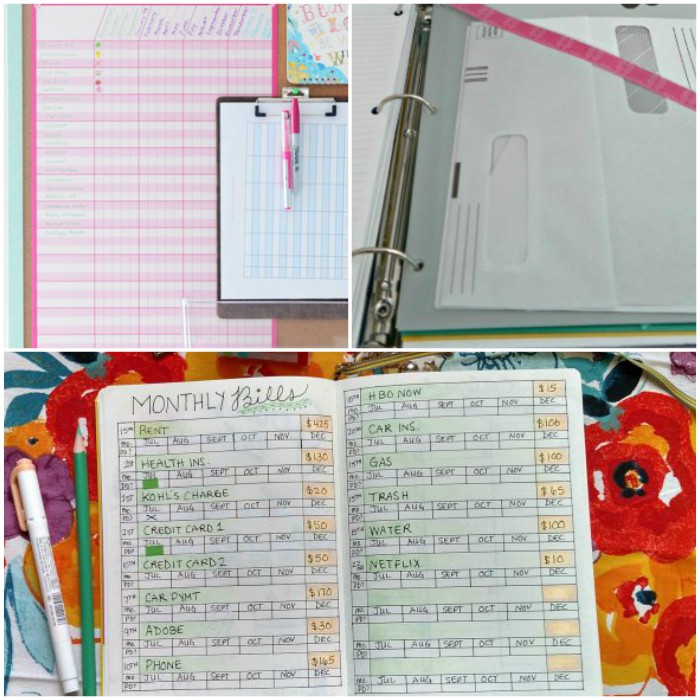
How do you track your bills? Share your tips with us on our Facebook Page!

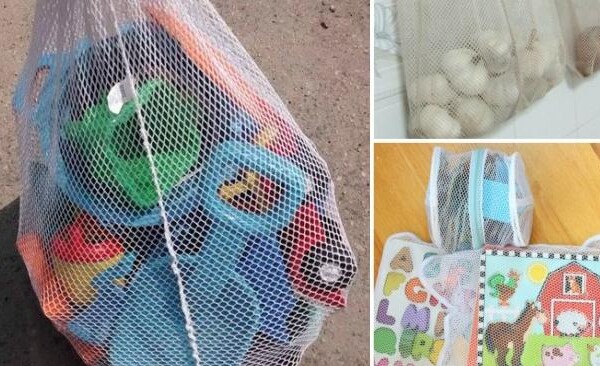

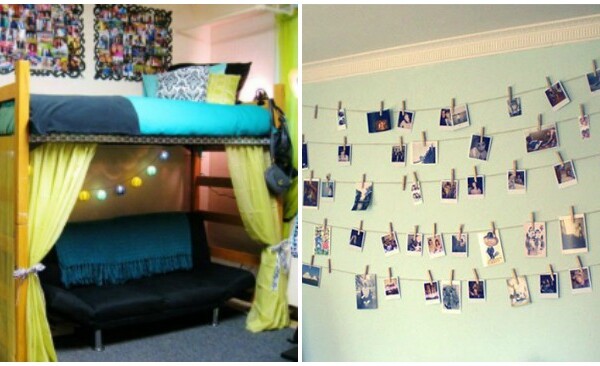
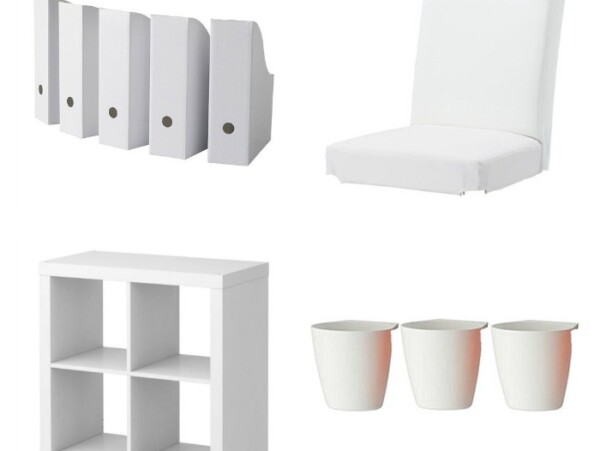




0